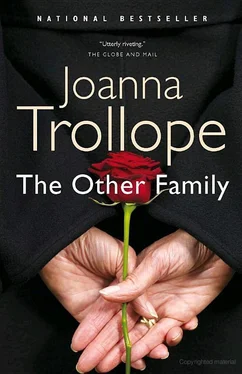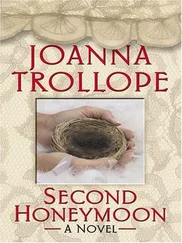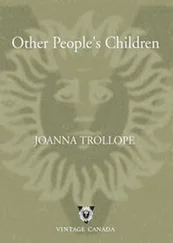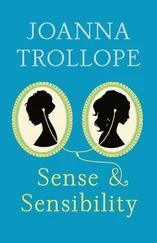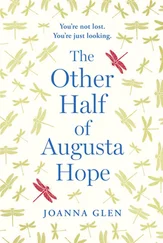Joanna Trollope - The Other Family
Здесь есть возможность читать онлайн «Joanna Trollope - The Other Family» весь текст электронной книги совершенно бесплатно (целиком полную версию без сокращений). В некоторых случаях можно слушать аудио, скачать через торрент в формате fb2 и присутствует краткое содержание. Жанр: Старинная литература, на английском языке. Описание произведения, (предисловие) а так же отзывы посетителей доступны на портале библиотеки ЛибКат.
- Название:The Other Family
- Автор:
- Жанр:
- Год:неизвестен
- ISBN:нет данных
- Рейтинг книги:5 / 5. Голосов: 1
-
Избранное:Добавить в избранное
- Отзывы:
-
Ваша оценка:
- 100
- 1
- 2
- 3
- 4
- 5
The Other Family: краткое содержание, описание и аннотация
Предлагаем к чтению аннотацию, описание, краткое содержание или предисловие (зависит от того, что написал сам автор книги «The Other Family»). Если вы не нашли необходимую информацию о книге — напишите в комментариях, мы постараемся отыскать её.
The Other Family — читать онлайн бесплатно полную книгу (весь текст) целиком
Ниже представлен текст книги, разбитый по страницам. Система сохранения места последней прочитанной страницы, позволяет с удобством читать онлайн бесплатно книгу «The Other Family», без необходимости каждый раз заново искать на чём Вы остановились. Поставьте закладку, и сможете в любой момент перейти на страницу, на которой закончили чтение.
Интервал:
Закладка:
At the back of the church, on the left rather than the right-hand side, Scott stood crammed against his mother. He couldn’t believe how ful the church was, nor what a ritzy congregation it was, with its air of barely suppressed flamboyance. They had arrived far too early, and had waited nervously on the gravel ed space outside, careful y not asking one another how they felt, how they would arrange themselves if – when – they came face to face with Richie’s other family.
Margaret had been doubtful about coming. She had wanted to, longed to, Scott could see that, but she had not wanted to be in a situation, or indeed to put anyone else in a situation – where old primitive energies might rise up and turn a ritual into a riot.
‘I want,’ Margaret said, ‘to remember him as he was.’ And then, a few minutes later, she said, ‘I want to say goodbye to him.’
In the end, Scott had decided for her. It wasn’t in his nature to insist, to be forceful, but it struck him that her regrets, her remorse, might insinuate themselves quietly and destructively into both their futures if she did not go to the funeral, and so he had said, in the voice he used for clients who wanted to have their cake and eat it, ‘We’re going.’
‘We can’t,’ Margaret said. She was in an armchair in her sitting room and Dawson was heavily in her lap. ‘I can’t be there with them.’
‘You can,’ Scott said. He’d opened a bottle of wine to encourage them both. ‘You can. You should.’
‘But—’
‘We’re going,’ Scott said.
‘But—’
‘We’l get the early train, do it, and be home for dinner.’
Margaret put her hand on Dawson’s head. He flattened his little ears to the point where he looked as if he didn’t have any, and was just an overblown example of a species of giant fur toad.
‘Thank you, pet,’ Margaret said.
So here they were, Margaret in black, he in his best dark work suit, hair gel ed, sober tie, uncomfortably damp palms, in a North London church packed with showbiz people, looking at a pale-wood coffin with brass handles – and his father inside. It occurred to him that he, as his father’s only son, and his mother, as his father’s wife, had more right to be there than anyone, more natural right. This was not the first time this primordial assertiveness had occurred to him, either. It had happened a few days earlier after the announcement of Richie’s death had appeared in the local press, fol owing a gauche little visit to Margaret, in her office, by a journalist too young to know anything of significance about Richie Rossiter, and impel ed him, boldly using the landline phone at the office, to ring the house in Highgate and inform them – no arguing – that he and his mother were coming to Richie’s funeral. He was braced to speak to Chrissie, or to one of those girls who were, improbably, his half-sisters, but he got an answering machine instead, and a young, disorganized voice – not Chrissie’s – asking him to leave his name and number and a message.
‘It’s Scott Rossiter speaking,’ Scott said. ‘I’m ringing to tel you that my mother and I wil be coming to the service on Friday, and returning North immediately afterwards.’
He’d paused then, wondering how to end the message. Should he say, ‘I thought you should know’? In the end, he said nothing, merely put the phone down, feeling that he had started that smal enterprise better than he’d finished it. When he told Margaret what he’d done she said, ‘Wel , pet, better that way,’ and he’d felt slightly cheated out of congratulation. But in the train, Margaret had rewarded him. She’d looked up from disapproving of her railway cardboard cup of tea and said, ‘I couldn’t do this on my own, Scott. And I couldn’t do it if they didn’t know, either.’
He looked down at her now. She wasn’t a smal woman, but he was considerably tal er than she was, tal er, he knew, than his father had been.
Heaven knows what was going on behind her resolute expression. She had felt about his father in a way that he was certain he had never yet felt about anybody, to a degree that, when his father left her, he managed at the same time to take the colour out of al other men for her. They’d met at junior school, in North Shields, their childhoods permeated with the same fish and ships and fierce local loyalty to North Tyneside. They were married in 1963, when his father was twenty-two, in the middle of the big freeze, when the old ferryboat, the Northumbrian , had to navigate its way across the Tyne among great chunks of ice floating in the river. A photograph taken on their wedding day, an unofficial photograph, showed them standing, hand tightly in hand, he in an Italian suit, she plainly frozen to death in a minidress and coat and white knee boots, watching people stream off the ferryboat from South Shields, housewives, shipyard workers, carts of rag-and-bone men, brewers’ drays, and none of those people were aware of the newly married couple, isolated on the edge of their own great adventure, gazing at them in the bitter wind.
Scott blinked. He hadn’t looked at that picture for twenty-five years; hadn’t wanted to. He wished he hadn’t remembered it now. He stared ahead.
At the front of the church, and to the right, he could see over the heads of the congregation to the front pew. Four women in black, three hatted. Two blondes, one medium brown, one dark, with no hat. Wel , that was them, then. The four women who had enveloped the last third of his father’s life as completely as if they’d always been there, and he and his mother had never existed. It was hard, real y, to know who to be angriest with.
He bent towards Margaret. She was glaring at her service sheet.
‘OK?’ he said.
‘There’s nothing here,’ Margaret said in a fierce whisper, ‘that he’d have wanted. Nothing .’
Amy had seen him as she came into church. She wasn’t looking for him, she’d just had her head up because a whole ten days since Dad’s death of people being so, so sorry for her, for them al , had made her feel that one more dol op of sympathy and she’d be sick, so she’d resolved to look as if sympathy was the last thing she wanted, and head them off that way. She’d almost stalked up the aisle, behind her mother, behind her sisters and their hats, and although she looked resolutely ahead, she’d caught him in her peripheral vision for the simple reason that, although he was tal er and slighter, he looked exactly like Dad, same nose, same jawline, hair growing exactly the same way. And, disconcertingly, his looking like Dad didn’t fil her with immediate outrage. It was weird, but it was comforting too. It was quite hard, in fact, to walk on up the aisle and not to stop, for a long, hungry stare.
She’d known he’d be there, after al . It was Amy who’d picked up the message on the answering machine and relayed it to her mother. Whether Chrissie told the others, Amy didn’t know, and didn’t ask. As the youngest, Amy had been good at reticence from an early age, having learned that silent observation often yielded her more useful information than yammering on al the time, like her sisters did, Tamsin instructing and Dil y wailing to be included.
‘He said,’ Amy told her mother, ‘that they’d come to the service and go away straight afterwards.’
‘I see,’ Chrissie said. She was at her computer, looking at something that seemed to be an invoice. ‘I shan’t seat them. I shan’t give them special places.’
‘OK,’ Amy said.
‘I can’t stop them. But I didn’t ask them—’
‘You don’t have to do anything,’ Amy said. ‘Their choice. You don’t have to do a thing.’
Chrissie had looked so tired. She’d looked quite unlike herself since Dad died, as if some inner light had been switched off somewhere. But today – wel , today she looked amazing. Amazing. Tam and Dil y did, too. Amy gave her head a tiny toss in order to shake her hair smoothly down her back. She hadn’t looked past Scott Rossiter in any detail, but she’d had a fleeting impression, one of those vivid nanoseconds of observation that sometimes tel you more than gazing at something for ages. She’d glimpsed her . And she looked like a granny.
Читать дальшеИнтервал:
Закладка:
Похожие книги на «The Other Family»
Представляем Вашему вниманию похожие книги на «The Other Family» списком для выбора. Мы отобрали схожую по названию и смыслу литературу в надежде предоставить читателям больше вариантов отыскать новые, интересные, ещё непрочитанные произведения.
Обсуждение, отзывы о книге «The Other Family» и просто собственные мнения читателей. Оставьте ваши комментарии, напишите, что Вы думаете о произведении, его смысле или главных героях. Укажите что конкретно понравилось, а что нет, и почему Вы так считаете.
